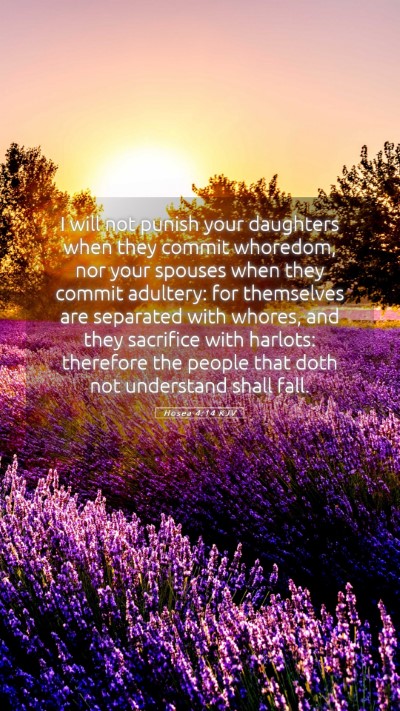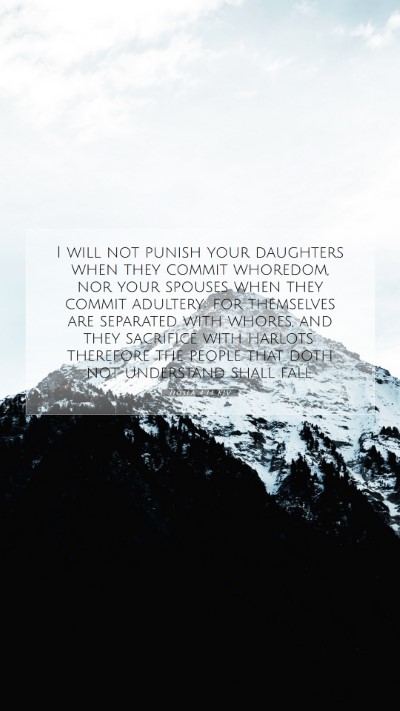Old Testament
Genesis Exodus Leviticus Numbers Deuteronomy Joshua Judges Ruth 1 Samuel 2 Samuel 1 Kings 2 Kings 1 Chronicles 2 Chronicles Ezra Nehemiah Esther Job Psalms Proverbs Ecclesiastes Song of Solomon Isaiah Jeremiah Lamentations Ezekiel Daniel Hosea Joel Amos Obadiah Jonah Micah Nahum Habakkuk Zephaniah Haggai Zechariah MalachiHosea 4:14 Meaning
What is the meaning of Hosea 4:14?
I will not punish your daughters when they commit whoredom, nor your spouses when they commit adultery: for themselves are separated with whores, and they sacrifice with harlots: therefore the people that doth not understand shall fall.
Hosea 4:14 Bible Verse Meaning
Understanding Hosea 4:14: A Comprehensive Commentary
The verse Hosea 4:14 states: "I will not punish your daughters when they commit whoredom, nor your spouses when they commit adultery: for themselves are separated with whores, and they sacrifice with harlots: therefore the people that do not understand shall fall." This verse provides profound insights into the spiritual and moral state of Israel and serves as a pivotal message about judgment and the consequences of spiritual unfaithfulness.
Contextual Background
In the Book of Hosea, the prophet communicates God's message amidst a backdrop of rampant idolatry and moral decay among the Israelites. The historical context reveals a nation that has strayed from true worship, engaging in corrupt practices that equate spiritual adultery against God.
Verse Meaning and Interpretation
-
Judgment without Punishment:
Matthew Henry points out that God indicates a lack of direct punishment upon individual women because their systemic sinfulness reflects the nation's collective failure. This conveys a concept of corporate responsibility, where the actions of individuals underscore a greater spiritual decline.
-
Lack of Understanding:
Albert Barnes highlights that the people suffer from ignorance—specifically, not acknowledging the consequences of their actions. This lack of understanding leads to their downfall, emphasizing the need for spiritual discernment and wisdom in scriptural teachings.
-
Symbolism of Harlotry:
Adam Clarke elaborates on the metaphor of harlotry as indicative of Israel's unfaithfulness to God. The term denotes both physical immorality and spiritual infidelity, calling attention to how the worship of foreign gods parallels infidelity in marriage.
-
Spiritual Complacency:
This verse highlights the complacency of the people. They accept their practices as normal, thus attracting further divine displeasure. The commentary emphasizes the dangers of becoming numb to sin.
Thematic Insights
This scripture encompasses several vital themes relating to:
-
The Nature of Sin:
Sin is portrayed not merely as isolated acts but as part of a broader cultural ethos that entraps individuals.
-
God’s Justice:
The verse conveys an important aspect of God's justice, showing that although He does not immediately punish, there are inevitable spiritual consequences for turning away from Him.
-
Consequence of Idolatry:
The reference to "sacrifice with harlots" stresses the intertwining nature of idolatry with society's moral fabric and the ensuing societal collapse.
Practical Applications
Understanding this verse compels us to examine our own lives regarding fidelity to God and the repercussions of allowing sin to infiltrate our hearts. It challenges readers to recognize the importance of spiritual awareness and the implications of our actions. Here are some potential applications:
- Self-Reflection: Analyze personal virtues and vices, validating the importance of staying true to one’s spiritual commitments.
- Accountability: Engage with Bible study groups to discuss interpretations and applications of scripture.
- Seeking Wisdom: Prioritize understanding scripture to avoid the ignorance condemned in this verse.
Cross References
For a deeper understanding of the themes within Hosea 4:14, consider exploring the following cross-references:
- Hosea 6:6: Reflects on the importance of mercy and knowledge over sacrifices.
- Jeremiah 5:7-9: Addresses spiritual infidelity and the consequences attached to it.
- Ezekiel 16:30-32: Discusses the metaphor of unfaithfulness in a marriage context, paralleling Israel's infidelity to God.
Conclusion
Hosea 4:14 serves as a profound reminder of the severity of spiritual adultery and the need for true understanding and commitment to God. By incorporating insights from Matthew Henry, Albert Barnes, and Adam Clarke, we gain clarity and depth in interpreting this passage. Engaging in further Bible study, whether in groups or through individual analysis, can lead to a richer understanding of scripture and its application to daily life.
As we pursue biblical exegesis and reflect on the meanings of scripture, we equip ourselves with the tools necessary for a robust faith, informed by the profound wisdom found throughout the Bible.


